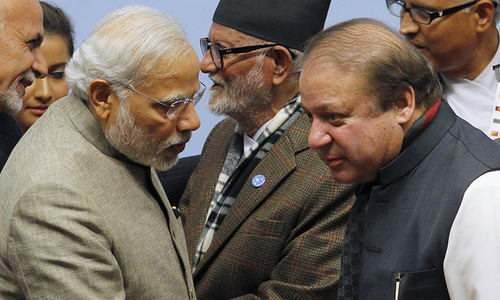
AS if the Panama Papers and Dawn report weren’t enough, the prime minister also has some explaining to do regarding Indian business tycoon Sajjan Jindal’s visit to Pakistan last week. The controversy isn’t surprising, given past accusations of Sharif’s softness for the Indian business world. And yet, it is unfair to paint Jindal’s audience with Sharif with the same brush as the other scandals.
The meeting couldn’t have been about private interests. Sharif wouldn’t have risked a meeting at such a precarious time for his government unless he was sure he had his bases covered. He would have known that Jindal’s arrival with a delegation and drive to Murree would not remain under wraps for long. The establishment had to have been on board.
So what’s this all about?
Most likely, it is the latest attempt by India and Pakistan to get back to talking stuff. While this is out of sync with the heated rhetoric emanating from New Delhi and Islamabad of late, I am not surprised at the initiative itself: no matter which way the leadership of these two countries comes at the problem, the indisputable fact is that India and Pakistan cannot serve their ultimate national objectives by ignoring each other in today’s global environment.
What was the Sharif-Jindal meeting all about?
One major change from the past is that the military option is truly obsolete. Neither side can fight their way to a Kashmir solution. The latest reminder of the futility of forcing the issue through non-diplomatic means was provided by the controversy surrounding the Uri attack and India’s ‘surgical strikes’ that followed. When you cut through all the noise the episode generated, the number one lesson you draw is that both sides lost. Terrorist attacks in the disputed territory bring Pakistan nothing but international humiliation — now with threats of international sanctions — and India learnt that its use-of-force options are all but non-existent. Meanwhile, risks of escalation in a nuclear environment are ever-present.
But there are broader, strategic reasons for engaging. Pakistan has spent much of its existence trying to ‘look west’; ally with external powers to stay outside India’s orbit of influence; fought wars; and used asymmetric means to settle scores. It hasn’t worked. Instead, India is building a decisive military and economic advantage in this equation. More of the same would, therefore, be suicidal for Pakistan.
For India too, the equation sans Pakistan will always be suboptimal. Prime Minister Modi tried his hand at the ‘isolate Pakistan’ policy. That too was never going to work. Successive Indian leaders have understood that India’s global ambitions will continue to be curtailed till disputes with Pakistan linger. India’s long-term needs for energy imports and connectivity to Central Asia and beyond also require an opening through Pakistan.
Encouragingly — and this may explain why the Jindal meeting was permissible — I find increasing evidence of this reality sinking in among the Pak-India establishments. One change in Pakistan especially is discernible — you don’t find nearly as much pushback to the basic idea that Pakistan’s future lies in a connected South Asia as you used to in the past. The debate now is on how, when, and on what terms, not why.
The timing of Jindal’s visit also suggests that decision-makers on both sides are mature enough to recognise the need to isolate tactical problems from strategic pursuits. It is not insignificant that this development has taken place amidst a major bilateral diplomatic row over ‘spy-gate’. In the past, this would have been reason enough to ‘wait for the right time’.
What is next?
Despite positive change, I don’t expect much. Policy mindsets, much less execution of policies, are unlikely to change in the short run. A one-step forward, two steps backward approach is likely to remain the norm. Both leaderships would have to tread carefully. Naysayers won’t forego an opportunity to cry foul, and domestic political compulsions, especially in India, will continue to throw a spanner in the works. The threat of a terror attack on the Indian side — not only remains real but will increase as bilateral engagement grows.
The realistic best-case scenario is that quiet conversations persist. To maximise chances of success, the interaction must be conducted purely through the backchannel format. No other mechanism has delivered tangible progress between the two sides in recent times. True, such secrecy leaves the public in the dark, but this would have to be corrected once conversations move beyond generic confidence building, to substantive problem solving.
Reports that Jindal’s visit may pave the way for a publicly announced Sharif-Modi meeting are worrying in this regard. Public signals of a thaw would stall the effort even before it has truly taken off. Both sides also need to agree on a verification mechanism to determine the origins of any terrorist attack that may otherwise sabotage talks, and avoid playing into the hands of non-state actors.
The writer is a foreign policy expert based in Washington, D.C.
Published in Dawn, May 2nd, 2017














































